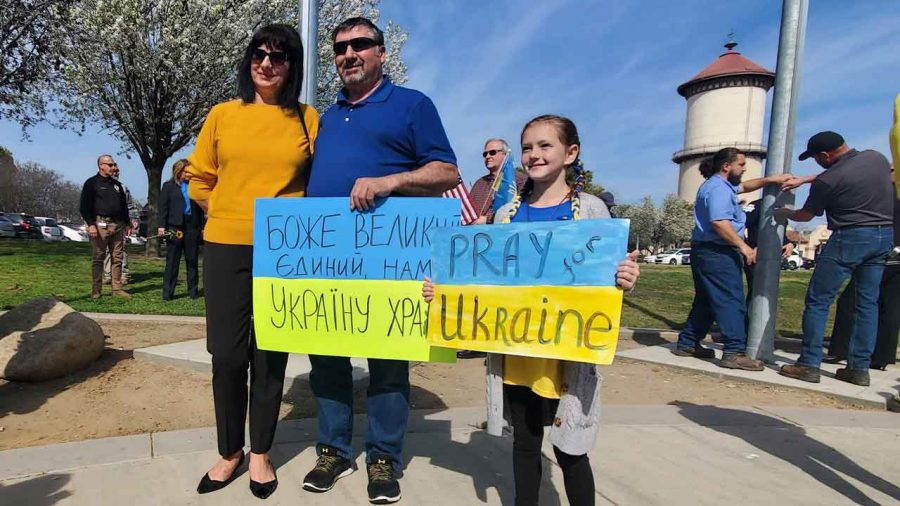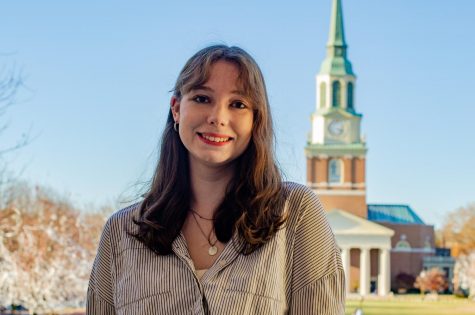Western response to Ukraine conflict betrays racism
The contrast between depictions of Ukrainian and non-European refugees displays discriminatory biases
The nearly unqualified welcoming of Ukrainian refugees raises questions about the rejection of refugees from other parts of the world.
March 2, 2022
As conflict rages on between Russia and Ukraine, people from all walks of life and sides of the political spectrum have come together in support of Ukraine. However, this support of Ukraine — when compared to the lack of support faced by those from the Global South in similar times of crisis — highlights the persistence of xenophobic and racist attitudes in the Western world.
On Feb. 25, Bulgarian prime minister Kiril Petkov was asked about the possibility of accepting refugees from Ukraine.
“These are not the refugees we are used to … these people are Europeans,” Petkov said to journalists. “These people are intelligent, they are educated people … This is not the refugee wave we have been used to, people we were not sure about their identity, people with unclear pasts, who could have been even terrorists … there is not a single European country now which is afraid of the current wave of refugees.”
CBS News foreign correspondent Charlie D’Agata made similar comments.
“[Ukraine] isn’t a place, with all due respect, like Iraq or Afghanistan that has seen conflict raging for decades,” D’Agata said. “This is a relatively civilized, relatively European — I have to choose those words carefully, too — city where you wouldn’t expect that or hope that it’s going to happen.”
D’Agata has since apologized for his comments.
These statements display racism and Islamophobia which — unfortunately — are not uncommon, and have been echoed in many other statements to the media.
“They seem so like us. That is what makes it so shocking. Ukraine is a European country. Its people watch Netflix and have Instagram accounts, vote in free elections and read uncensored newspapers,” Daily Telegraph reporter Daniel Hannan wrote. “War is no longer something visited upon impoverished and remote populations. It can happen to anyone.”
This implication that war only matters when it affects wealthier populations and people “like us” comes from a place of privilege and is deeply problematic. Even when Western populations choose to care about the suffering of people that are not “like them,” this so-called concern often manifests itself in the form of white saviorism — which paints non-Europeans as passive recipients of white benevolence and white people as their liberators or rescuers.
These comments are especially disconcerting when considering recent trends in European foreign policy. Over the past couple of years, governments across Europe have toughened migration and asylum policies and doubled down on border surveillance, earning the continent the nickname “Fortress Europe”.
Yet now that Europeans are refugees, leaders such as Hungarian prime minister Viktor Orban are making comments such as, “We’re letting everyone in.”
This demonstrates how leaders’ past issues with immigration don’t stem from immigration itself, but from the identities of prospective immigrants. Racial and religious identities should not prevent someone from being able to seek refuge — yet they do.
As author Ibram X. Kendi tweeted in response to Hannan’s article, “If only human beings recognized all human beings as ‘like us.’ If only racist ideas did not transform peoples of color into ‘remote’ populations. If only ‘anyone’ included everyone.”
In 2015, Russia intervened in Syria, unleashing levels of death and suffering not yet seen in Ukraine — but the Western response was not as empathetic. U.S. invasions and military operations in Afghanistan and Iraq, the Saudi-led war in Yemen and the Israeli occupation of Palestine have been met with similar responses —that is the lack thereof.
European refugees are treated with more compassion than their Global South counterparts. What is happening in Ukraine is not fair or just, but neither is the human suffering and war that has occurred beyond the Global North. We have seen this before — and many people are failing to acknowledge that.
“This is arguably the first war we’ve seen (actually seen in real-time) take place in the age of social media,” a Vanity Fair special correspondent said in a now-deleted tweet.
This demonstrates another problem in the Western media: how, rather than taking accountability for comments such as these, culprits often just sweep them under the rug — which only serves to perpetuate the issue further.
I have seen countless people post photos and infographics on their Instagram stories condemning the war in Ukraine — people who remained silent when non-European populations faced similar threats.
The grace and support that the West is currently extending to Ukraine should reach beyond the scope of this conflict to humanity as a whole. I hope when non-Western countries are threatened — as they already have been — the West remembers and echoes the support that they have given to Ukraine, rather than minimizing their suffering.

















Jermell Williams • Apr 13, 2022 at 1:51 am
You’re right, Where are all the black people who are worried about the Ukrainians? Great take.
Ramon • Mar 10, 2022 at 11:23 am
Really touching article!